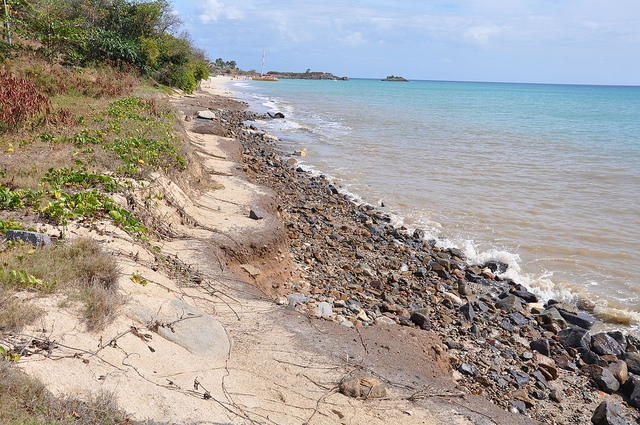Saving Caribbean Tourism from the Sea

By Desmond Brown ——————
BRIDGETOWN, Barbados (IPS) – Faced with the prospect of losing miles of beautiful white beaches – and the millions in tourist dollars that come with them – from erosion driven by climate change, Barbados is taking steps to protect its coastline as a matter of economic survival.
“We need to be able to preserve those beaches. We need to be able to preserve our coral reefs. We need to preserve the marine life of our country, which is part of what tourists come to the Caribbean for,” Ronald Sanders, a former regional diplomat, told IPS.
The impacts of climate change on economies like Barbados could be more severe than any global economic recession.
“All of those things are now, even as we speak, being eroded, and sitting back and doing nothing about it is not in our interest,” he said.
“If there is continuous erosion of the beaches, that is the very thing that you are selling worldwide. You are saying ‘we have great beaches, come and enjoy them and pay for the privilege’, but if you have no beaches, what are you selling?” Sanders added.
Tourism is one of the largest industries in the world, with an estimated 500 million people spending billions of dollars on tourism-related services annually. In addition, the industry employs more than 100 million people worldwide.
Tourism accounts for 15 percent of Gross Domestic Product (GDP) in Barbados, with the beaches playing a significant role.
Foreign Affairs Minister Maxine McLean stresses that Barbados has not been spared the effects of climate change.
“There is no greater threat to the survival, viability and security of Barbados than the threat posed by climate change,” she said.
And Barbados is not alone. Sanders said almost every Caribbean country is selling the same thing. He is proposing a united approach.
“Barbados alone can’t act, Antigua alone can’t act, St. Vincent alone can’t act. It’s only if we act together in concert with other countries that have the same problem that people will listen to us,” he told IPS.
Sustainable Programme Manager at the Caribbean Tourism Organisation Gail Henry said the Caribbean region has been seeing impacts of climate change for some time.
“We are seeing instances of greater periods of drought, greater periods of unanticipated precipitation in periods that are outside of the typical rainy season,” she told IPS. “There are issues of salt water intrusion, coastal erosion. These are some of the typical impacts of climate change that we are aware of that will occur, according to science.”
She said Barbados and its Caribbean neighbours will have to look at creating a more diversified tourism product that’s not just hinged on the typical sun, sea and sand.
In the interim, she said they will have to put structures in place to save the beaches.
“Once you have a tourism product that is hinged around the coastline, you have to be concerned about things like the impact of sea level rise,” she said. “Countries would really need to look at the way they plan where their resorts are sited and they will also have to look at what they can do because the cost of actually trying to move a resort is probably not feasible.”
With assistance from the Inter-American Development Bank (IDB), Barbados is already taking steps to protect and manage its beaches and coastline. The Coastal Risk Assessment and Management Programme (CEMP) is being carried out over five years at a cost of 42.2 million dollars.
Barbados is also one step closer to fully establishing a Regional Climate Centre (RCC). The United States is providing more than five million dollars in funding over the next three years to establish the centre.
“The programme is timely and its objectives will build critical capacities at regional and national levels to access, analyse and use climate data to better inform decision-making in climate-sensitive sectors,” said the permanent secretary in the Ministry of Agriculture, Food, Fisheries and Water Resources Management, Esworth Reid.
Noting that Small Island Developing States (SIDS) were susceptible to climate change, Reid says that the outputs and outcomes from the programme would contribute to their sustainable development.
He said this would be done through supporting the region’s initiatives to adapt to climate change and increasing climate variability and disaster risk reduction.
“I envisage a Caribbean resilient to climate risks and hydro-meteorological hazards, an inheritance we can be proud to pass onto future generations,” he noted.
Reid warned that the impacts of climate change on economies like Barbados could be more severe than the impact of any global economic recession.
“At least our governments can manipulate current tax structures and public expenditure in an attempt to dampen the effect of a global economic recession on the local economy, but such policies would not work when the economy is impacted by a phenomenon such as climate change,” he said.
Principal of the Barbados-based Caribbean Institute for Meteorology and Hydrology (CIMH) Dr. David Farrell explained that the Centre was concerned about building the capacity of people to do things for their own region.
“We need to be able to tell people how to plan, and this investment will ensure that we have some level of sustainability,” he told IPS.
Among the benefits of the programme are seasonal forecasting capabilities; access to the use of remote sensing data for assessing climatological risk; enhancing the statistical capabilities of the CIMH; and communications and marketing.
The U.S. ambassador to Barbados and the Eastern Caribbean, Larry Palmer, said the Centre would also help the region to better understand how the climate was changing and how its people could best respond strategically to increase the resilience of economies, ecosystems and communities.
He added that it would also strengthen the capacity of the CIMH and national institutions across the region to monitor the changing climate and to convert data into products that would better inform decision-making in climate-sensitive sectors.
April 17, 2014














